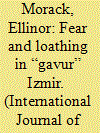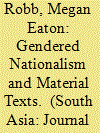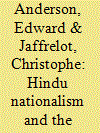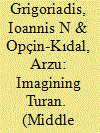|
|
|
Sort Order |
|
|
|
Items / Page
|
|
|
|
|
|
|
| Srl | Item |
| 1 |
ID:
152356


|
|
|
|
|
| Summary/Abstract |
Based on a series of recollections published between January and April 1926 in the Izmir-based daily newspaper Ahenk (Harmony), this article explores how individual Muslim Turks remembered their emotional responses to the Greek occupation of that city (May 1919–September 1922). Analyzing these recollections, it considers why certain events were remembered while others were almost completely left out. By studying how Muslim Turks described their feelings towards the occupying forces, local non-Muslims, and the eventually victorious Turkish army, the article makes an initial contribution to the history of emotions in early republican Turkey. I argue that the composition and consumption of memories were avenues for connecting emotionally to the Turkish nationalist project. This finding challenges the widespread notion that the early republican period was characterized by collective amnesia of the immediate past, and contributes to the growing body of scholarship on popular participation in early republican nationalism.
|
|
|
|
|
|
|
|
|
|
|
|
|
|
|
|
| 2 |
ID:
184801


|
|
|
|
|
| Summary/Abstract |
While there exists a substantial body of work on the reformist writings and women’s periodicals of the late colonial period, this article contributes to a newer conversation extending analysis of print periodicals into the post-colonial period through a discursive and material analysis of Akhbār-e Khavātīn (Women’s Newspaper), a Karachi magazine from 1966 edited by a journalist named Mussarat Jabin. Paying attention to how a woman’s magazine was produced, collected and archived makes visible the previously invisible choices of print technicians, editors and collectors. Even though the conditions of many of these choices remain obscured, this article argues that attention to the material conditions of printing and archiving offer new avenues for reflection. Akhbār-e Khavātīn normalised women’s journalism, and also gestured towards the presence of male editors and owners, technicians who collaborated with the editors to create print periodicals, and towards the American archivists who sought to preserve the magazines for nationalist aims.
|
|
|
|
|
|
|
|
|
|
|
|
|
|
|
|
| 3 |
ID:
165241


|
|
|
|
|
| Summary/Abstract |
This in-depth interview with Professor Christophe Jaffrelot – one of the world’s most distinguished, prolific, and versatile scholars of contemporary South Asia – focuses on his first area of expertise: Hindutva and the Hindu nationalist movement. In conversation with Dr Edward Anderson, Jaffrelot considers the development of Hindutva in India up to the present day, in particular scrutinising ways in which it has evolved over the past three decades. The discussion explores the diversity of Hindu nationalism and how the movement and ideology have spread beyond the purview of the RSS into various new spaces and normalised, vernacular expressions of ‘neo-Hindutva’. The interview also reflects on recent tensions involving vigilantism and the banalisation of Islamophobia and anti-Dalit violence, and considers what Hindutva’s current proliferation will mean for the future of Indian democracy.
|
|
|
|
|
|
|
|
|
|
|
|
|
|
|
|
| 4 |
ID:
174166


|
|
|
|
|
| Summary/Abstract |
While scholarly interest in the influence of Tatar intellectuals on Turkish nationalism has been strong, less attention has been paid to the interactions between Russian Azerbaijani and Ottoman Turkish intellectuals. This study applies theoretical tools developed by Benedict Anderson in the study of ethnic nationalism in the late Ottoman and Russian Empires. In doing so, this study focuses on the works of one leading intellectual from each side, Hüseyinzade Ali [Turan] and Mehmet Ziya [Gökalp]. Particular attention is paid to the concept of Turan, which they defined and elaborated as both a political ideal and a key element of the nationalist ideology they espoused through four poems they authored, two of which have homonymous titles. Their different views of the limits of the Turanian ‘imagined community’ and the political operationalization of the concept shed light on the development of ethnic nationalism in the declining Ottoman and Russian Empires. Ever since, Turan has become a significant symbolic conceptual tool that has fired the imaginations of Turkic nationalists (without, yet, having led to the establishment of a serious political movement).
|
|
|
|
|
|
|
|
|
|
|
|
|
|
|
|
|
|
|
|
|